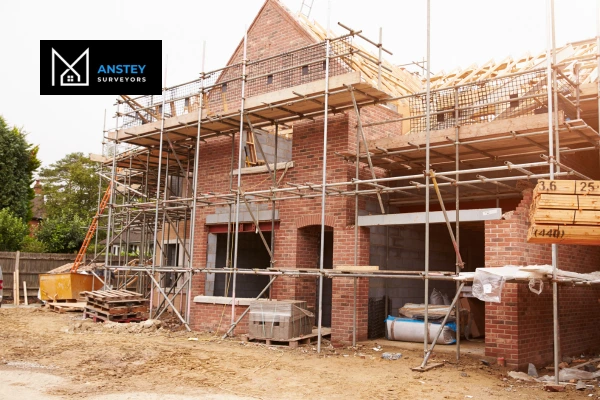Party Walls by Anstey Surveyors Leighton Buzzard
As trusted experts in party wall surveying, we provide professional. Reliable services designed to meet your unique needs. Our dedicated team is committed to delivering clear. High-quality advice and tailored guidance every step of the way.
Get in touch with us today!


At Anstey Surveyors. We are proud to deliver expert party wall services. Throughout England and Wales. Our team of experienced surveyors provides efficient. Fixed-fee, and cost-effective solutions. No matter where your property is. Drawing on extensive expertise, our trained experts. Handle all aspects of party wall matters. Offering special customer service. To ensure your project progresses seamlessly.
Whether you’re in a bustling city or a tranquil rural area, we tailor our advice to meet the unique challenges of your location.
Whether you’re a building owner or an adjoining owner, we’re here to guide you through every stage of the party wall process. From preparing and serving notices to resolving disputes and issuing awards.
Including party structure notices, Section 1 notices, and Section 6 notices.
We understand that party wall matters can often feel complex and daunting. That’s why our approach is client-focused, transparent, and thorough. Our mission is to provide clear guidance at every step, ensuring you fully understand your rights and responsibilities under the Party Wall etc. Act 1996.
Or perhaps your neighbour’s project involves a shared wall or boundary? Reach out to us today for a free, no-obligation consultation. At Anstey Surveyors, we are dedicated to delivering practical, precise, and professional solutions, handling your party wall concerns with the care and expertise you deserve.
Party walls are a critical aspect of many construction and renovation projects across England and Wales. By definition, a party wall is a shared boundary or dividing structure between two or more properties, which can become a source of disputes if not handled properly.
In England and Wales, party wall matters are regulated by the Party Wall etc. Act 1996, which has been in force since 1 July 1997. This legislation does not extend to Scotland or Northern Ireland. The Act provides a clear legal framework for managing party wall agreements and resolving disputes. It outlines the responsibilities of property owners undertaking work that affects a shared wall, involves constructing a new boundary wall, or requires excavation near a neighbouring property within specific distances.
To comply with the Act and minimise the risk of disputes, property owners and builders should consult a qualified party wall surveyor. These professionals offer vital expertise in meeting legal requirements, issuing and responding to Party Wall Notices, and navigating the dispute resolution process. For neighbours receiving a Party Wall Notice, seeking advice from a surveyor is equally important to understand their rights and available options. A surveyor can also mediate disagreements during construction, ensuring the interests of all parties are protected and contributing to a smoother, more cooperative project outcome.
Under the Party Wall etc. Act 1996, serving a party wall notice is a legal obligation for specific types of construction work that could affect shared walls, party fence walls, new walls, or excavations near neighboring properties. Below are some common examples of work that typically require a party wall notice:
It’s important to note that not all construction projects require a party wall notice. Routine maintenance or repairs that do not compromise the structural integrity of a shared wall or fence wall are often exempt. However, if you’re unsure whether your project necessitates a notice, consulting a qualified party wall surveyor is highly recommended. Their expertise can ensure compliance with the Party Wall etc. Act 1996 and help you avoid potential disputes with neighbors.

A Party Wall Award is a formal legal document that:
Outlines the agreed works
Details the condition of the properties
Includes obligations and timelines for all parties
This Award protects the rights of property owners and adjoining owners.
How Does the Process Work?
Planning construction work near a shared wall or boundary in the UK? It’s essential to comply with the Party Wall etc. Act 1996. A key aspect of this process is serving a party wall notice, which legally informs your neighbours about the proposed work and seeks their agreement.
To issue this notice, you or your appointed surveyor must first identify all affected parties and outline the details of the planned work. The notice should include clear and comprehensive drawings that illustrate the scope of the project, enabling recipients to fully understand the proposal and make an informed decision.
When undertaking building work, particularly on parts of buildings like a wall of a building or floor partition, it’s essential to consider the Party Wall etc Act. This legislation applies to structures on lands of different owners, like a garden wall or wooden fences, and outlines a clear process to prevent disputes. For example, when creating a new building near a line of junction or the foundations of the building, owners must serve a notice period to neighbouring property owners.
The owner of land must include details of the works, the cost of the project, and the address of the building owner. If the neighbouring owner has concerns, they can issue a counter notice. Hiring an agreed surveyor or your own surveyor ensures reasonable costs and adherence to the provisions of the act, reducing unnecessary inconvenience.
Additional considerations, like special foundations or planning permission, may involve local authority approval. An explanatory booklet or professional advice can clarify rights and responsibilities. Disputes often reach the county court, requiring clarity on details of construction and reasonable cause for legal action. Proper management of surveyors’ fees and maintenance of example flats or properties under want of repair can help secure smooth implementation of works.
The party walls are part of a building. Sometimes with separate staircases. They connect to the neighbouring building or external wall. For further information around your build or Surveyor’s fees speak to us today!
Once the notice is prepared, it must be served to all relevant parties, including neighbouring property owners and leaseholders. Delivery can be conducted in person, by post, or via email, but it’s crucial to ensure that the notice is issued in a timely and legally compliant manner.
What Are the Three Types of Party Wall Notice?
Party Structure Notice
This notice applies to work involving an existing party wall, such as alterations, cutting into the wall, or its removal. It must be served at least two months before the intended start date.
Section 1 Notice
Used for the construction of a new wall along a boundary line between two properties. This notice requires service at least one month prior to the proposed start date.
Section 6 Notice
Relevant for excavation work near the foundations of a neighbouring property, which could impact the stability of the party wall. This notice must also be served at least one month before the work begins.
All party wall notices must comply with the Party Wall etc. Act 1996. Failure to correctly serve these notices can result in legal disputes or financial penalties.
If your neighbours consent to the notice, the process is straightforward, and party wall obligations are resolved. However, if they object or fail to respond, surveyors will need to be appointed to mediate the issue and issue a legally binding Party Wall Award.
Does the Award Include a Condition Survey? Of a party wall act?
Yes, condition surveys are a vital part of the process. These surveys meticulously document the existing state of neighbouring properties before any work begins, ensuring an accurate record to refer back to if needed.
A party wall award, also known as a party wall agreement or surveyors’ award, is a legally binding document established under the Party Wall Act 1996. It sets out the rights and responsibilities of both the building owner and the adjoining owner regarding construction works that may impact shared or adjoining structures. Typically issued by the appointed surveyors—or in the case of a dispute, by a third surveyor—it provides a clear framework to prevent conflicts and protect property.
A party wall award is not required if the adjoining owner consents to the works outlined in the Notice(s). However, when needed, it defines the scope of the project and ensures that any risks or potential damages are appropriately managed.
The party wall award serves as a critical document to ensure construction is carried out safely, responsibly, and with minimal disruption to the adjoining owner. It protects the interests of all parties involved and helps mitigate potential conflicts or legal issues. Adhering to the terms of the award is essential, and surveyors play a pivotal role in overseeing the process, ensuring that the building owner fulfills their obligations while respecting the rights of the adjoining owner.
What Happens Once an Award Is Served?
Once the Award is served:
Works must comply with the agreed terms of the Award.
Post-works assessments may be conducted to ensure compliance and document any changes to neighbouring properties.
A schedule of condition, though not a legal requirement under the Party Wall etc. Act 1996, is strongly recommended for anyone planning construction work near shared boundaries.
This document provides a thorough and detailed record of the adjoining property’s condition before any work begins. Its key purpose is to serve as evidence in case damage occurs during the construction process. By capturing the property’s original state, it allows both parties to fairly assess and address any potential damage resulting from the work.
While not obligatory, creating a schedule of condition benefits both the building owner and the adjoining owner. It helps prevent disputes by offering clear, impartial documentation and ensures any issues can be resolved more efficiently.
For these reasons, arranging a schedule of condition before starting construction—even if a party wall notice has been agreed upon—is a wise precaution. Party wall surveyors can assist in preparing this essential document, promoting transparency and fostering smoother communication between all involved parties.
Why Choose Anstey Surveyors?
Specialised Expertise
Deep knowledge of the Party Wall Act, ensuring smooth and compliant processes.
Proven Track Record
Successfully resolving complex disputes, offering peace of mind to our clients.
Transparent Pricing
No hidden fees, just expert service you can trust.
Clear Communication
We ensure you understand your rights and responsibilities every step of the way.
Tailored Solutions
Services designed to meet your unique needs.
Get Started Today